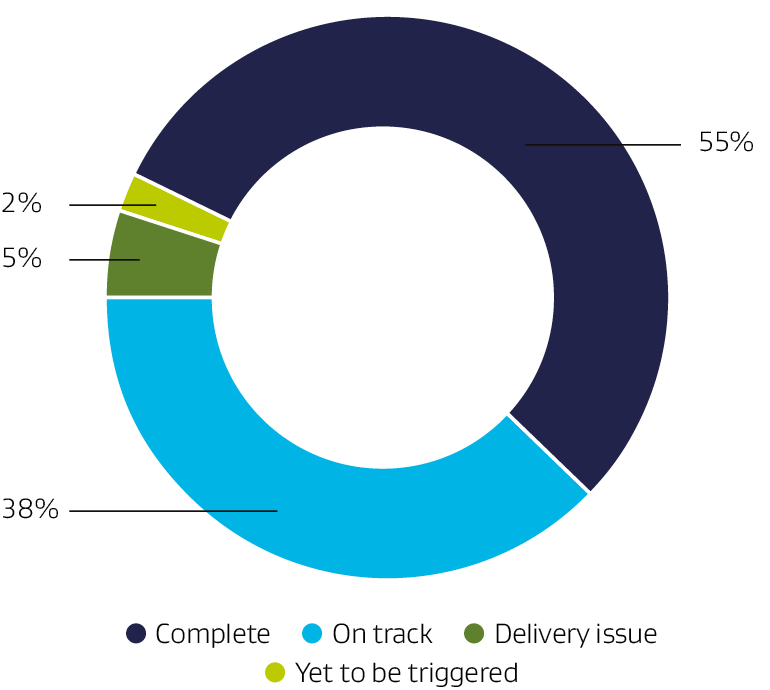Māori-Crown relations
On this page
Treaty settlement commitments
He Korowai Whakamana, a Cabinet-agreed framework, requires core Crown agencies to record and track the status of, and report annually on, their settlement commitments. Te Arawhiti – the Office for Māori Crown Relations is the lead agency and responsible for tracking the Crown’s overall progress with delivering on Treaty settlement commitments.
As part of He Korowai Whakamana, core Crown agencies will report on the status of their settlement commitments from 2023/24.
MBIE, on behalf of the Crown, is responsible for fulfilling a range of commitments made to iwi groups as part of the settlement of historical Treaty claims. These commitments are recorded in deeds of settlements and Treaty settlement Acts. MBIE has 245 Treaty settlement commitments across 60 settlements.
As at 30 June 2024, most of the commitments MBIE is responsible for have been completed (55% or 136 commitments) or are on track (38% or 93 commitments). The high number of commitments ‘on track’ relate to the establishment and operations of ongoing relationships, including Crown Minerals Protocols, Iwi–Crown Accords and relationship agreements.
Status of Treaty settlement commitments

Texr description for graph - Status of Treaty settlement commitments
Of the commitments, 175 relate to Crown Minerals Protocols, the Crown Minerals Act 1991 or natural resources generally. Fifty commitments relate to the establishment of formal relationships, like Iwi–Crown Accords (all-of-government relationships that include obligations on Ministers), bilateral and multi-agency relationship agreements between MBIE and iwi groups.
Te Tāpuhipuhi
During the year, we also launched Te Tāpuhipuhi, MBIE’s partner with Māori strategy, to deliver on one of the focus areas of our organisational strategy, Te Ara Amiorangi. It includes 4 pou:
- Herenga Waka makes sure we have systems that enable strong relationships and improved outcomes for Māori.
- Whakaputanga makes sure we have the processes, policies and services that enable strong relationships and improved outcomes for Māori.
- Pūkenga enables the individual and organisational capability for strong relationships with, and improved outcomes for, Māori.
- Rangatiratanga makes sure we demonstrate leadership and accountability individually and as an organisation.
Treaty guidance for policy
Policy, and associated legislation, is a core part of how the Crown governs national affairs. It is also essential for supporting the Crown in its relationship with Māori under the Treaty of Waitangi/Te Tiriti o Waitangi.
This year we developed the Treaty Guidance for Policy, which outlines the way we can incorporate the Treaty/ Te Tiriti in our policy development. It is set out in 4 steps: understanding the context, identifying what good looks like, developing options and delivery. MBIE uses the Treaty Guidance for Policy to support its policy practitioners and programmes to have the capability and guidance to uphold MBIE responsibilities under the Treaty/Te Tiriti and the Public Service Act 2020. It is important we maintain consistent practices when we work with iwi, hapū or within te ao Māori, and the guidance helps people to understand and apply the Treaty/Te Tiriti in their policy development process.
Whāinga Amorangi and Te Ara Reo Rangatira
The Public Service Act 2020 section 14 explicitly recognises the role of the Public Service in supporting the Crown in its relationships with Māori under the Treaty/Te Tiriti. To support the public service to meet its commitments, Te Arawhiti – the Office for Māori Crown Relations developed and led the implementation of Whāinga Amorangi: Transforming Leadership. This is a cross public service initiative under which every agency has a plan to build their individual and organisational capability to engage with iwi Māori. Whāinga Amorangi supports MBIE in meeting its Māori-Crown relations responsibilities under the Public Service Act 2020 and increases MBIE’s capability in Māori-Crown relations.
Our ability to work in partnership with Māori aims to be enduring and consistent across MBIE and the public sector. Whāinga Amorangi is designed to empower our people to build understanding and confidence across core capabilities. We recognise our people are at various stages of their journey and will require differing levels of support to build their capability in Māori-Crown relations.
The strategy supports our people to build Māori-Crown relations capability, increases our understanding of why the Māori-Crown relationship is important and how to reflect this in our work/mahi every day.
Whāinga Amorangi includes 4 capability areas:
- Te reo Māori
- Te Tiriti o Waitangi/the Treaty of Waitangi and Aotearoa New Zealand history
- Tikanga/customs and kawa/protocols
- Engagement with Māori.
Our Māori language strategy, Te Ara Reo Rangatira, is an important part of Whāinga Amorangi. This strategy outlines MBIE’s commitment to supporting the development and use of te reo Māori as a valued and living official language of Aotearoa New Zealand.
For more information on how we are progressing Whāinga Amorangi and Te Ara Reo Rangatira, see appendix 8 in the PDF version of the Annual report.

